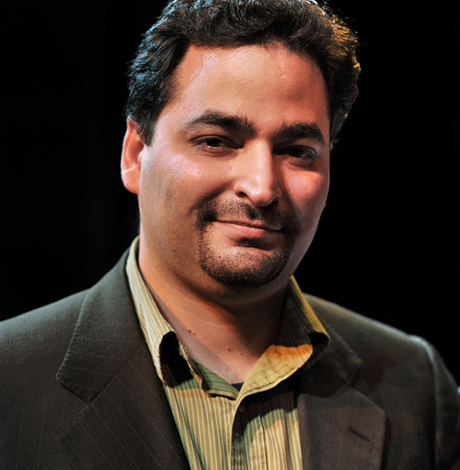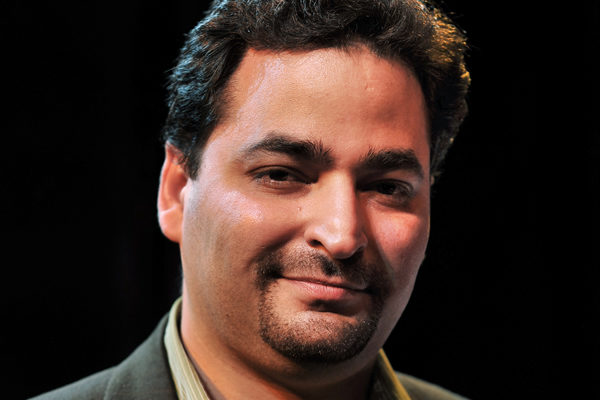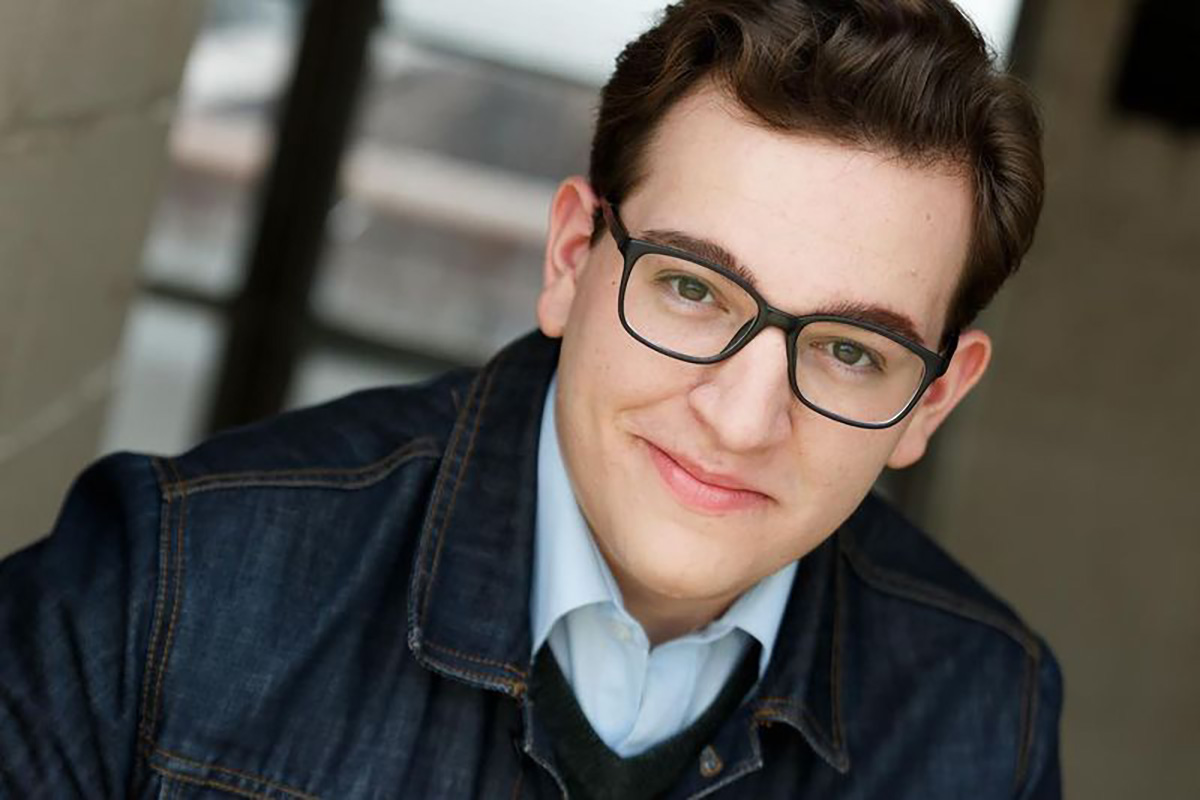Theater
1888 classic gets modern makeover in ‘sexy, dangerous’ ‘Queen of Basel’
Director Jose Zayas helms Studio premiere that featured down-to-the-wire rewrites


‘Queen of Basel’
Through April 7
Studio Theatre
1501 14th St., N.W.
$20-90
202-332-3300
José Zayas says his career is complicated. While the out director mostly focuses on new plays, he appreciates staging classics and beloved musicals. He works a lot in Spanish, but also in English. And he’s a self-defined “genre freak” with a weakness for horror and sci-fi.
As director of Studio Theatre’s world premiere production “Queen of Basel” by playwright Hilary Bettis, Zayas brings together his love for what’s old and new.
A Latin-infused take on August Strindberg’s naturalistic 1888 classic “Miss Julie,” Bettis’ version recreates the sexy and dangerous psychosexual struggle, while moving the action from a Midsummer’s Eve on the estate of a count in Sweden to the kitchen of a South Beach hotel during Art Basel, Miami’s weeklong trendy art party. Like the source material, the new play is about class, power and desire, but also adds race and immigration status to the mix.
“I light-designed a production of ‘Miss Julie’ in college” and have seen a lot of productions,” says Zayas, 44. “I love the play’s passion and madness but not the misogyny.”
Bettis’ adaptation, he explains, addresses misogyny, updates the story and does something exciting with what it means to be Latinx in the U.S.: “The play tries to figure out who we are as a people, where we’re from and what is our place in this country. Using ‘Miss Julie’ to deal with those issues is a stroke of genius in many ways.”
In Strindberg’s classic, Julie is a nobleman’s daughter who becomes too intimately involved with the help. Here, Julie (Christy Escobar) is the heiress to a real estate fortune. Part Colombian and part North American white, she straddles two worlds, and while culturally all over the place, her life is primarily defined by class, money and power. When she unwittingly becomes involved John (Andy Lucien), a Cuban/Haitian Uber driver and Christine (Dalia Davi) a Venezuelan cocktail waitress with Riveting backstory, things go wildly awry.
Now based in New York, Zayas was born in Puerto Rico and grew up in the U.S. Virgin Islands.
“There wasn’t a lot of theater where we lived. I didn’t see a play until I was 18,” he says. “But I spent a lot of time reading and writing plays in high school.”
As the first person in his family to go to college, Harvard University no less, Zayas was expected to pursue a career in medicine or law, so he majored in pre-med.
“I hated it,” he says. “But I didn’t hate theater. There was no theater concentration at Harvard, but there were great resources for those who were interested. So, I happily became involved with the dramatic club and started writing and directing, and quickly changed my major to English.”
After graduating, Zayas worked in theater for two years and then earned a graduate degree in directing from Carnegie Mellon University.
“As an adolescent, I was pretty much gay, Catholic and angry. But I accepted my gayness. It’s just that I hid it from everyone else. It took me a long time to talk to family about it — some still don’t know. I am most happy in the rehearsal room working on a new project with communities that we create for a month or two.”
He adds, “Today the anger is still there. It just comes out in the work. My personal life is relaxed.”
During the first days of rehearsals for “Queen of Basel,” playwright Bettis essentially rewrote the play, Zayas says.
“In her effort to adapt Strindberg, she had momentarily forgot herself as a playwright, so she needed to start over to make her voice heard. All of us were willing to play our part in the process. It was like a creation in real time. Our conversations were really of the moment. About what’s happening in the room. And the country.”
As a director, Zayas keeps his audience in mind when staging a new play. “I’d like a heavily Latinx audience, but I have to be he has to be realistic. Much of regional theatergoers are older and white, so we address that by defining things that might be new to them. It’s a strong play. Brutal. Sexual. As long as you respect the audience’s intelligence and do things with a modicum of taste, I think people will connect to it.”
Zayas’ partner is Stephin Merritt, songwriter and principal singer for The Magnetic Fields, a staple on the indie music scene. The couple have successfully collaborated in the past. Zayas, who directed Merritt’s “The Magnetic Fields: 50 Song Memoir” (a concert based on Merritt’s life and gay history), enjoyed working with his mate and would like to meld talents and energies in the near future. “Gay content isn’t something I get to do all the time,” he says. “I’d like to do more.”
There’s no gay content in “Queen of Basel.”
“Not explicitly. But some gay men will connect to Julie’s grand diva role. The over-the-top person she is. And how she deals with the world.”
Theater
‘Octet’ explores the depths of digital addiction
Habits not easily shaken in Studio Theatre chamber musical

‘Octet’
Through Feb. 26
Studio Theatre
1501 14th Street, N.W.
Tickets start at $55
Studiotheatre.org
David Malloy’s “Octet” delves deep into the depths of digital addiction.
Featuring a person ensemble, this extraordinary a capella chamber musical explores the lives of recovering internet addicts whose lives have been devastated by digital dependency; sharing what’s happened and how things have changed.
Dressed in casual street clothes, the “Friends of Saul” trickle into a church all-purpose room, check their cell phones in a basket, put away the bingo tables, and arrange folding chairs into a circle. Some may stop by a side table offering cookies, tea, and coffee before taking a seat.
The show opens with “The Forest,” a haunting hymn harking back to the good old days of an analog existence before glowing screens, incessant pings and texts.
“The forest was beautiful/ My head was clean and clear/Alone without fear/ The forest was safe/ I danced like a beautiful fool / One time some time.”
Mimicking an actual step meeting, there’s a preamble. And then the honest sharing begins, complete with accounts of sober time and slips.
Eager to share, Jessica (Chelsea Williams) painfully recalls being cancelled after the video of her public meltdown went viral. Henry (Angelo Harrington II) is a gay gamer with a Candy Crush problem. Toby (Adrian Joyce) a nihilist who needs to stay off the internet sings “So anyway/ I’m doing good/ Mostly/ Limiting my time/ Mostly.”
The group’s unseen founder Saul is absent, per usual.
In his stead Paula, a welcoming woman played with quiet compassion by Tracy Lynn Olivera, leads. She and her husband no longer connect. They bring screens to bed. In a love-lost ballad, she explains: “We don’t sleep well/ My husband I/ Our circadian rhythms corrupted/ By the sallow blue glow of a screen/ Sucking souls and melatonin/ All of my dreams have been stolen.”
After too much time spent arguing with strangers on the internet, Marvin, a brainy young father played by David Toshiro Crane, encounters the voice of a God.
Ed (Jimmy Kieffer) deals with a porn addiction. Karly (Ana Marcu) avoids dating apps, a compulsion compared to her mother’s addiction to slot machines.
Malloy, who not only wrote the music but also the smart lyrics, book, and inventive vocal arrangements, brilliantly joins isolation with live harmony. It’s really something.
And helmed by David Muse, “Octet” is a precisely, quietly, yet powerfully staged production, featuring a topnotch cast who (when not taking their moment in the spotlight) use their voices to make sounds and act as a sort of Greek chorus. Mostly on stage throughout all of the 100-minute one act, they demonstrate impressive stamina and concentration.
An immersive production, “Octet” invites audience members to feel a part of the meeting. Studio’s Shargai Theatre is configured, for the first, in the round. And like the characters, patrons must also unplug. Everyone is required to have their phones locked in a small pouch (that only ushers are able to open and close), so be prepared for a wee bit of separation anxiety.
At the end of the meeting, the group surrenders somnambulantly. They know they are powerless against internet addiction. But group newbie Velma (Amelia Aguilar) isn’t entirely convinced. She remembers the good tech times.
In a bittersweet moment, she shares of an online friendship with “a girl in Sainte Marie / Just like me.”
Habits aren’t easily shaken.
Theater
Out dancer on Alvin Ailey’s stint at Warner Theatre
10-day production marks kickoff of national tour

Alvin Ailey American Dance Theater
Through Feb. 8
Warner Theatre
513 12th St., N.W.
Tickets start at $75
ailey.org
The legendary Alvin Ailey American Dance Theater is coming to Washington’s Warner Theatre, and one of its principal veterans couldn’t be more pleased. Out dancer Renaldo Maurice is eager to be a part of the company’s 10-day stint, the kickoff of a national tour that extends through early May.
“I love the respectful D.C. crowd and they love us,” says Maurice, a member of esteemed modern dance company for 15 years. The traveling tour is made of two programs and different casting with Ailey’s masterwork “Revelations” in both programs.
Recently, we caught up with Maurice via phone. He called from one of the quiet rooms in his New York City gym where he’s getting his body ready for the long Ailey tour.
Based in North Newark, N.J., where he recently bought a house, Maurice looks forward to being on the road: “I enjoy the rigorous performance schedule, classes, shows, gym, and travel. It’s all part of carving out a lane for myself and my future and what that looks like.”
Raised by a single mother of three in Gary, Ind., Maurice, 33, first saw Alvin Ailey as a young kid in the Auditorium Theatre in downtown Chicago, the same venue where he’s performed with the company as a professional dancer.
He credits his mother with his success: “She’s a real dance mom. I would not be the man or artist I am today if it weren’t for the grooming and discipline of my mom. Support and encouragement. It’s impacted my artistry and my adulthood.”
Maurice is also part of the New York Ballroom scene, an African-American and Latin underground LGBTQ+ subculture where ball attendees “walk” in a variety of categories (like “realness,” “fashion,” and “sex siren”) for big prizes. He’s known as the Legendary Overall Father of the Haus of Alpha Omega.
WASHINGTON BLADE: Like many gay men of his era, Ailey lived a largely closeted public life before his death from AIDS-related complications in 1989.
RENALDO MAURICE Not unusual for a Black gay man born during the Depression in Rogers, Texas, who’s striving to break out in the industry to be a creative. You want to be respected and heard. Black man, and Black man who dances, and you may be same-sex gender loving too. It was a lot, especially at that time.
BLADE: Ailey has been described as intellectual, humble, and graceful. He possessed strength. He knew who he was and what stories he wanted to tell.
MAURICE: Definitely, he wanted to concentrate on sharing and telling stories. What kept him going was his art. Ailey wanted dancers to live their lives and express that experience on stage. That way people in the audience could connect with them. It’s incredibly powerful that you can touch people by moving your body.
That’s partly what’s so special about “Revelations,” his longest running ballet and a fan favorite that’s part of the upcoming tour. Choreographed by Alvin Ailey in 1960, it’s a modern dance work that honors African-American cultural heritage through themes of grief, joy, and faith.
BLADE: Is “Revelation” a meaningful piece for you?
MAURICE: It’s my favorite piece. I saw it as a kid and now perform it as a professional dance artist. I’ve grown into the role since I was 20 years old.
BLADE: How can a dancer in a prestigious company also be a ballroom house father?
MAURICE: I’ve made it work. I learned how to navigate and separate. I’m a principal dancer with Ailey. And I take that seriously. But I’m also a house father and I take that seriously as well.
I’m about positivity, unity, and hard work. In ballroom you compete and if you’re not good, you can get chopped. You got to work on your craft and come back harder. It’s the same with dance.
BLADE: Any message for queer audiences?
MAURICE: I know my queer brothers and sisters love to leave with something good. If you come to any Ailey performance you’ll be touched, your spirit will be uplifted. There’s laughter, thoughtful and tender moments. And it’s all delivered by artists who are passionate about what they do.
BLADE: Alvin Ailey has been a huge part of your life. Thoughts on that?
MAURICE: I’m a believer in it takes a village. Hard work and discipline. I take it seriously and I love what I do. Ailey has provided me with a lot: world travel, a livelihood, and working with talented people here and internationally. Alvin Ailey has been a huge part of my life from boyhood to now. It’s been great.
Theater
Swing actor Thomas Netter covers five principal parts in ‘Clue’
Unique role in National Theatre production requires lots of memorization

‘Clue: On Stage’
Jan. 27-Feb. 1
The National Theatre
1321 Pennsylvania Ave., N.W.
thenationaldc.com
Out actor Thomas Netter has been touring with “Clue” since it opened in Rochester, New York, in late October, and he’s soon settling into a week-long run at D.C.’s National Theatre.
Adapted by Sandy Rustin from the same-titled 1985 campy cult film, which in turn took its inspiration from the popular board game, “Clue” brings all the murder mystery mayhem to stage.
It’s 1954, the height of the Red Scare, and a half dozen shady characters are summoned to an isolated mansion by a blackmailer named Mr. Boddy where things go awry fairly fast. A fast-moving homage to the drawing room whodunit genre with lots of wordplay, slapstick, and farce, “Clue” gives the comedic actors a lot to do and the audience much to laugh at.
When Netter tells friends that he’s touring in “Clue,” they inevitably ask “Who are you playing and when can we see you in it?” His reply isn’t straightforward.
The New York-based actor explains, “In this production, I’m a swing. I never know who’ll I play or when I’ll go on. Almost at any time I can be called on to play a different part. I cover five roles, almost all of the men in the show.”
Unlike an understudy who typically learns one principal or supporting role and performs in the ensemble nightly, a swing learns any number of parts and waits quietly offstage throughout every performance just in case.
With 80 minutes of uninterrupted quick, clipped talk “Clue” can be tough for a swing. Still, Netter, 28, adds, “I’m loving it, and I’m working with a great cast. There’s no sort of “All About Eve” dynamic going on here.”
WASHINGTON BLADE: Learning multiple tracks has got to be terrifying.
THOMAS NETTER: Well, there certainly was a learning curve for me. I’ve understudied roles in musicals but I’ve never covered five principal parts in a play, and the sheer amount of memorization was daunting.
As soon as I got the script, I started learning lines character by character. I transformed my living room into the mansion’s study and hallway, and got on my feet as much as I could and began to get the parts into my body.
BLADE: During the tour, have you been called on to perform much?
NETTER: Luckily, everyone has been healthy. But I was called on in Pittsburgh where I did Wadsworth, the butler, and the following day did the cop speaking to the character that I was playing the day before.
BLADE: Do you dread getting that call?
NETTER: Can’t say I dread it, but there is that little bit of stage fright involved. Coming in, my goal was to know the tracks. After I’d done my homework and released myself from nervous energy, I could go out and perform and have fun. After all, I love to act.
“Clue” is an opportunity for me to live in the heads of five totally different archetype characters. As an actor that part is very exciting. In this comedy, depending on the part, some nights it’s kill and other nights be killed.
BLADE: Aside from the occasional nerves, would you swing again?
NETTER: Oh yeah, I feel I’m living out the dream of the little gay boy I once was. Traveling around getting a beat on different communities. If there’s a gay bar, I’m stopping by and meeting interesting and cool people.
BLADE: Speaking of that little gay boy, what drew him to theater?
NETTER: Grandma and mom were big movie musical fans, show likes “Singing in the Rain,” “Meet Me in St. Louis.” I have memories of my grandma dancing me around the house to “Shall We Dance?” from the “King and I” She put me in tap class at age four.
BLADE: What are your career highlights to date?
NETTER: Studying the Meisner techniqueat New York’sNeighborhood Playhouse for two years was definitely a highlight. Favorite parts would include the D’Ysquith family [all eight murder victims] in “A Gentleman’s Guide to Love & Murder,” and the monstrous Miss Trunchbull in “Matilda.”
BLADE: And looking forward?
NETTER: I’d really like the chance to play Finch or Frump in Frank Loesser’s musical comedy “How to Succeed in Business Without Really Trying.”
BLADE: In the meantime, you can find Netter backstage at the National waiting to hear those exhilarating words “You’re on!”




















